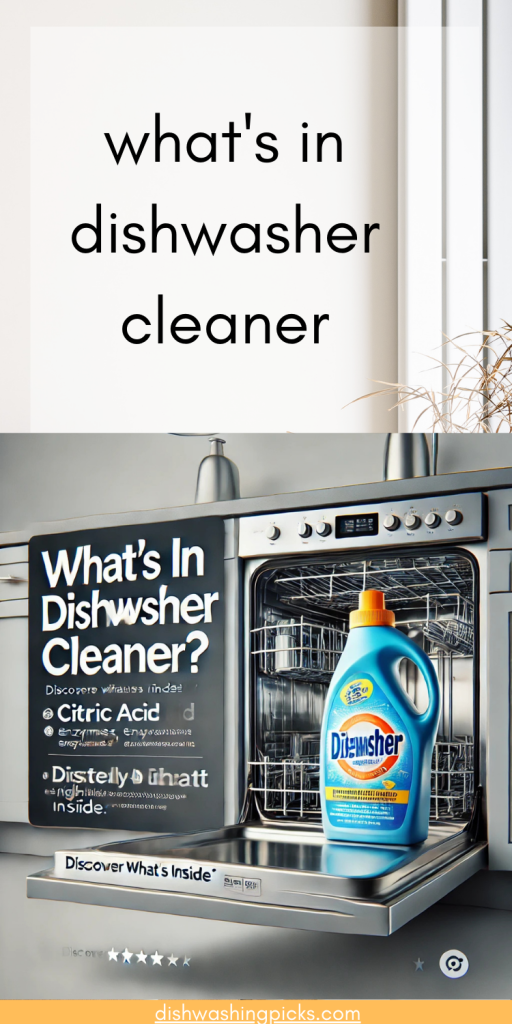If you’ve ever pulled out a supposedly “clean” glass only to find water spots or a weird film, your dishwasher might need a deep clean. But what exactly is inside those commercial dishwasher cleaners that get the job done? And are there better alternatives? Let’s find out!
1. Surfactants – The Grease Fighters
Think of surfactants as tiny warriors battling grease and grime. They break down oily residues so water can wash them away easily.
Common surfactants in dishwasher cleaners:
- Sodium lauryl sulfate (SLS) – A common foaming agent that helps lift dirt.
- Alcohol ethoxylates – Found in many cleaners, these are great at cutting grease without leaving residue.
Why it matters: Without surfactants, food particles and grease would just smear around instead of getting rinsed away. No thanks!
2. Citric Acid – The Limescale Buster
If you live in an area with hard water, you probably know the struggle of limescale buildup. Citric acid is a natural way to dissolve mineral deposits and prevent that chalky residue.
Where you’ll find it:
- Many eco-friendly cleaners use citric acid as their primary active ingredient.
- It’s also why some people use lemon juice as a DIY dishwasher cleaner!
Why it matters: Keeps your dishwasher’s heating elements, spray arms, and interior free from mineral buildup.
3. Enzymes – The Food Fighters
Ever found bits of yesterday’s pasta clinging to your plates? That’s where enzymes come in. They break down food residues so they can be easily washed away.
Common enzymes in dishwasher cleaners:
- Protease – Breaks down proteins (like eggs and dairy).
- Amylase – Breaks down starches (think pasta, bread, and potatoes).
- Lipase – Targets fats and oils.
Why it matters: Without enzymes, food particles would linger, causing odors and bacteria buildup. No one wants a smelly dishwasher!
4. Bleaching Agents – The Stain Removers
Bleach-based cleaners are powerful at removing stains and disinfecting your dishwasher. However, they’re not found in all products because they can be harsh on certain materials.
Common bleaching agents:
- Sodium percarbonate (Oxygen bleach) – Breaks down into water and oxygen, making it safer than chlorine bleach.
- Chlorine bleach – Found in heavy-duty cleaners for deep sanitization.
Why it matters: Helps keep your dishwasher stain-free and eliminates bacteria.
5. Sodium Bicarbonate (Baking Soda) – The Odor Neutralizer
If your dishwasher has a funky smell, baking soda is your best friend. It neutralizes odors and provides gentle scrubbing power.
Fun fact: Many people use straight-up baking soda as a DIY cleaner—it’s cheap and effective!
Why it matters: Keeps your dishwasher fresh between deep cleans.
6. Polycarboxylates & Phosphates – The Water Softeners
These ingredients help prevent hard water stains and keep your dishwasher running efficiently. However, phosphates have been banned in many household detergents due to environmental concerns.
Modern cleaners use alternatives like:
- Sodium citrate – A biodegradable water softener.
- Polycarboxylates – Help prevent minerals from redepositing on dishes.
Why it matters: Helps maintain water quality and keeps dishes spotless.
Final Thoughts: Do You Need a Store-Bought Cleaner?
The short answer? Not always! If you’re dealing with heavy buildup, a commercial cleaner can be a lifesaver. But for regular maintenance, household staples like vinegar, baking soda, and citric acid can work wonders.
💡 Best routine?
✅ Use vinegar or citric acid once a month to remove limescale.
✅ Sprinkle baking soda in between washes to control odors.
✅ Check your filter regularly to avoid buildup.

